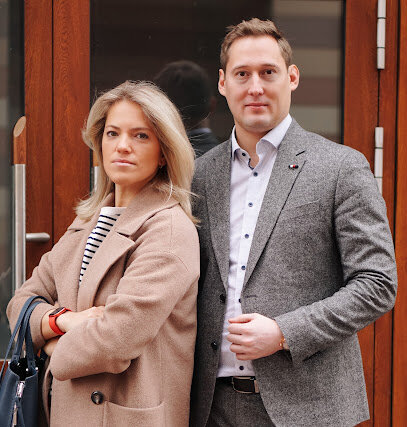Best Government Relations & Lobbying Lawyers in Perm
Share your needs with us, get contacted by law firms.
Free. Takes 2 min.
List of the best lawyers in Perm, Russia
About Government Relations & Lobbying Law in Perm, Russia
Government relations and lobbying in Perm refer to organized efforts by individuals, businesses, non-governmental organizations and interest groups to influence decisions by public officials in Perm city and Perm Krai. Unlike some jurisdictions, Russia does not have a single, comprehensive federal lobbying statute. Instead, activity that aims to influence public decision-making is governed indirectly through a mix of federal and regional laws concerning anti-corruption, civil service, public procurement, political activity, administrative procedure and criminal liability for bribery and abuse of office. In Perm these general rules interact with regional regulations, administrative practices and the policies of local authorities.
Practical government relations work in Perm typically involves building relationships with administration officials, participating in public consultations, responding to calls for proposals and tenders, securing permits and licenses, and ensuring compliance with reporting and conflict-of-interest rules. Because the legal framework is dispersed across several acts and authorities, those engaging with Perm public bodies need to pay close attention to transparency and anti-corruption requirements.
Why You May Need a Lawyer
Engaging in government relations and lobbying in Perm can expose individuals and organizations to complex legal requirements and potential risks. You may need a lawyer if you face any of the following situations:
- Preparing to participate in public procurement or bidding processes where strict procurement rules and anti-corruption controls apply.
- Seeking permits, licenses or land use approvals from Perm city or Perm Krai authorities and needing help drafting applications or responding to objections.
- Planning a stakeholder engagement or advocacy campaign that involves contact with public officials and requires a compliance framework to avoid allegations of improper influence.
- Setting up a representative office, charity, industry association or political entity that will interact with government institutions and must meet registration and reporting obligations.
- Responding to inspections, audits, administrative enforcement actions or criminal investigations by regional authorities, the prosecutor's office or federal agencies.
- Drafting internal compliance policies, gift and hospitality rules, conflict-of-interest procedures and training for staff to minimize legal exposure.
- Advising foreign companies or representatives on restrictions that apply to non-residents and sanctioned entities when engaging with Perm authorities.
Local Laws Overview
The regulatory framework relevant to government relations and lobbying in Perm combines federal legislation, regional regulations and administrative practice. Key aspects to understand include:
- Anti-corruption and bribery rules. Federal laws prohibit bribery, offering improper advantages to officials and accepting gifts beyond prescribed limits. Civil servants must follow asset and income declaration regimes. Violations can lead to administrative sanctions, dismissal, fines and criminal charges.
- Civil service and public official restrictions. Laws regulate outside employment, participation in commercial activities, and conflicts of interest for state and municipal employees. These restrictions may affect how and when you may contact specific officials or use intermediaries.
- Public procurement rules. The Federal Law on Contract System for Procurement and related regulations control bidding, tendering and contracts with government bodies. Procurement procedures are subject to transparency rules and oversight by agencies such as the Federal Antimonopoly Service and regional procurement commissions.
- Administrative procedure and public consultations. Administrative laws set how authorities adopt policies, hold hearings and solicit public input. Participation rules differ by subject and level of authority - from municipal committees to the Perm Krai administration.
- Criminal law provisions. The Russian Criminal Code criminalizes bribery, commercial bribery, abuse of office and related offenses. Conduct that crosses legal boundaries can trigger criminal investigation by federal or regional law enforcement.
- Regional regulations and local practices. Perm Krai and Perm city may have rules and codes governing interactions with officials, registers, permit procedures and local procurement specifics. Administrative practices and expectations can vary by department and over time.
Frequently Asked Questions
Is lobbying legal in Perm and in Russia?
Yes, advocacy and efforts to influence government policy are not inherently illegal. However, there is no single federal law labeled "lobbying" that creates a registration regime like in some other countries. Instead, activities must comply with anti-corruption, public service and procurement laws. Crossing into bribery, illicit influence or unauthorized paid advocacy can lead to administrative or criminal liability.
Do I need to register as a lobbyist in Perm?
There is generally no mandatory local registration specifically called a lobbyist register for private lobbyists in Perm. However, specific activities may trigger registration or reporting obligations - for example, registering organizations, foreign agents, charities or political entities, and complying with procurement and public disclosure requirements. Always check current regional rules and the legal status of your organization.
Can foreign companies engage in government relations in Perm?
Foreign companies can engage with Perm authorities, but they must comply with Russian and local laws. Foreign entities operating in Russia often establish a local legal presence or work through Russian partners or representatives. Additional restrictions or scrutiny may apply for entities from jurisdictions subject to sanctions or export control measures.
What kinds of conduct risk criminal prosecution?
Conduct that may lead to criminal prosecution includes offering or giving bribes to officials, receiving bribes by officials, abusing official powers, fabricating documents in public procurement, and other forms of corruption or fraud. Even seemingly benign incentives or favors can be risky if they are intended to influence an official act.
Are gifts and hospitality allowed when dealing with officials in Perm?
Gifts and hospitality to public officials are tightly regulated. Civil servants often face specific limits and prohibitions on accepting gifts, and employers and private parties should avoid any benefits that could be construed as influencing official duties. If you plan to provide hospitality in a professional context, consult legal counsel to ensure compliance and to document transparency.
How should I document interactions with Perm public authorities?
Keep written records of meetings, requests, official responses and submitted documents. Use formal letters, meeting minutes and email summaries where possible. Good record-keeping helps demonstrate lawful intent, supports responses to audits or inquiries, and is a core element of compliance programs.
How do I participate in public consultations or hearings?
Public consultations are announced by the responsible authority and will include procedural rules and deadlines. Prepare concise, evidence-based submissions, follow formal submission channels, and consider engaging local experts or associations who are familiar with the authority's expectations.
What should be included in a compliance program for government relations?
A practical compliance program should include a code of conduct, clear procedures for contacting officials, gift and hospitality rules, conflict-of-interest policies, training for employees and representatives, due diligence on third parties, secure record-keeping, and a mechanism for reporting concerns. Tailor the program to the scale and risk profile of your activities in Perm.
How can I find a qualified lawyer in Perm for government relations matters?
Look for lawyers or law firms with experience in administrative law, anti-corruption, public procurement, and government relations. Ask about local experience in Perm Krai, knowledge of regional authorities, previous representation in similar matters, and references from clients. A local lawyer with good relations and procedural knowledge of Perm administrative bodies is particularly valuable.
What are the typical penalties for violating rules on interactions with officials?
Penalties can range from administrative fines and disqualification from procurement processes to criminal charges with severe consequences such as fines, asset recovery, and imprisonment for serious bribery and corruption offenses. Organizations may also face reputational damage and exclusion from public contracts.
Additional Resources
Below are types of local and federal institutions and organizations that are useful when seeking information or assistance related to government relations in Perm:
- Perm Krai Administration and regional ministries - for rules, permits and public consultations.
- Perm City Administration and municipal departments - for city-level permits, land use and local procurement matters.
- Perm Krai Duma and municipal councils - for legislative and regulatory developments affecting local policy.
- Regional prosecutor's office and law enforcement agencies - for information about enforcement and investigative practice.
- Federal Antimonopoly Service - oversees procurement competitiveness and may provide guidance on tender rules.
- Ministry of Justice regional offices and registration authorities - for organizational registration and compliance matters.
- Industry associations, chambers of commerce and professional legal networks in Perm - for local market knowledge and peer guidance.
Next Steps
If you need legal assistance with government relations and lobbying matters in Perm, follow these steps:
- Identify the specific issue and gather all relevant documents - correspondence, contracts, permits, meeting notes and procurement materials.
- Conduct an internal risk assessment - identify potential compliance gaps, conflict of interest issues or exposure to procurement and anti-corruption rules.
- Consult a local lawyer experienced in administrative, procurement and anti-corruption law - request an initial case assessment and a proposed plan of action.
- Establish or update internal policies and record-keeping practices to ensure future interactions with Perm authorities are transparent and documented.
- If facing an investigation or enforcement action, refrain from destroying records or contacting potentially implicated officials - follow your lawyer's instructions immediately.
- Maintain an ongoing compliance review and training program to reduce future legal and reputational risk.
Taking these steps will help you approach government relations in Perm in a lawful and constructive way while reducing the risk of disputes or enforcement actions. Professional legal advice tailored to your facts is essential for effective navigation of the regional regulatory environment.
Lawzana helps you find the best lawyers and law firms in Perm through a curated and pre-screened list of qualified legal professionals. Our platform offers rankings and detailed profiles of attorneys and law firms, allowing you to compare based on practice areas, including Government Relations & Lobbying, experience, and client feedback.
Each profile includes a description of the firm's areas of practice, client reviews, team members and partners, year of establishment, spoken languages, office locations, contact information, social media presence, and any published articles or resources. Most firms on our platform speak English and are experienced in both local and international legal matters.
Get a quote from top-rated law firms in Perm, Russia — quickly, securely, and without unnecessary hassle.
Disclaimer:
The information provided on this page is for general informational purposes only and does not constitute legal advice. While we strive to ensure the accuracy and relevance of the content, legal information may change over time, and interpretations of the law can vary. You should always consult with a qualified legal professional for advice specific to your situation.
We disclaim all liability for actions taken or not taken based on the content of this page. If you believe any information is incorrect or outdated, please contact us, and we will review and update it where appropriate.










